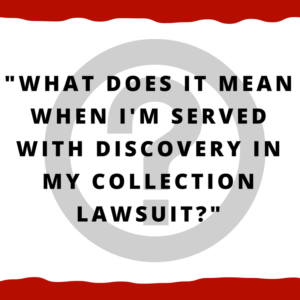What does it mean when I’m served with discovery in my collection lawsuit?
“What does it mean when I’m served with discovery in my collection lawsuit?”
 In a collection suit, sometimes you’re served with discovery.
In a collection suit, sometimes you’re served with discovery.
You may be wondering, “What in the world is this?”
Discovery is where the other side is allowed to ask you questions and for certain documents.
This is where they ask for Request for Production, Interrogatories, and Request for Admissions.
If you’re served with discovery, your case should be in Circuit Court.
Request for Production
This is where they ask for documents such as credit card statements, bank statements, a document that lists the address that you’ve lived at, or whatever they want to ask for.
Interrogatories
Think of the word “interrogation.”
That is basically what interrogatories are.
It’s a written interrogation where they ask you things such as, “when did you take out this debt?”
Then you respond to those questions.
Request for Admissions
This is where they say, “admit or deny this.”
“Admit you took this payment out.”
“Admit you didn’t pay this debt.”
Or, “Admit that we now own the debt.”
Just a bit of advice, never admit that they own it, as there’s no way you can know that.
Deposition
This is where you sit in a room while the lawyer asks you questions and a court reporter transcribes your testimony.
During deposition, you respond to the questions.
What does all this mean?
Well, you have 30 days to respond to Request for Production, Interrogatories, and Request for Admissions.
If you don’t, then you’ve “waived” objections, and in the case of admissions you’ve admitted to what they’ve asked you.
Many times what companies will do, and they do this sneakily, is that they will serve you with this discovery that has request for admissions buried inside such as, “admit that the company purchased the debt,” and, “Admit that you have no defense to this case.”
Many people will get this discovery and Google what to do.
They come to the conclusion that they don’t need to answer it.
However, if you don’t answer, you’ve admitted to owing the debt to the company and whatever else they have asked you to admit.
Then they will hit you with a summary judgement.
Take it seriously if you’re served with discovery, because now you’ve entered a more complex level of answering and objecting correctly and in a timely manner.
Based on how you answer discovery, you could lose your case.
But if you don’t answer the discovery, you could lose your case, so this is dangerous territory for you.
Feel free to contact with us if you have any questions
If you have questions about discovery, feel free to call us at 1-205-879-2447.
You can also fill out a contact form and we will get in touch with you as soon as possible.
I look forward to talking with you.
Have a great day.
John:
Very good and well done!
Cool guy in video!
Seems like I once knew HIM!??? Maybe not??
Beau
Maybe so Beau!
🙂
Thanks!
John Watts